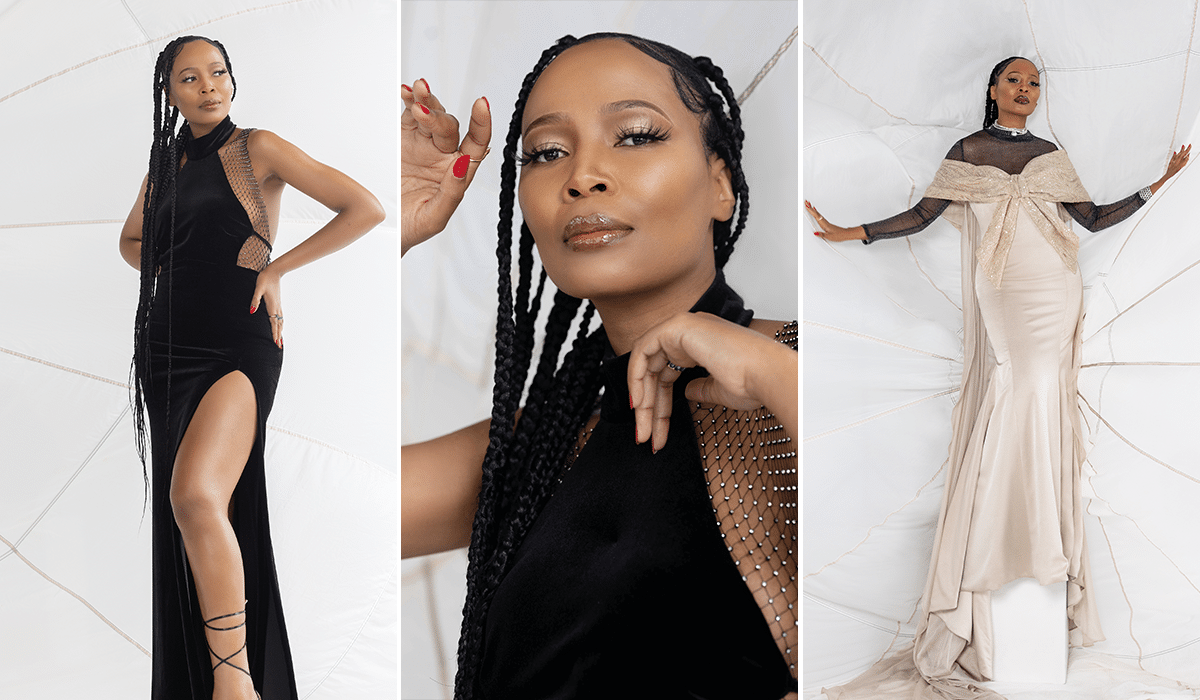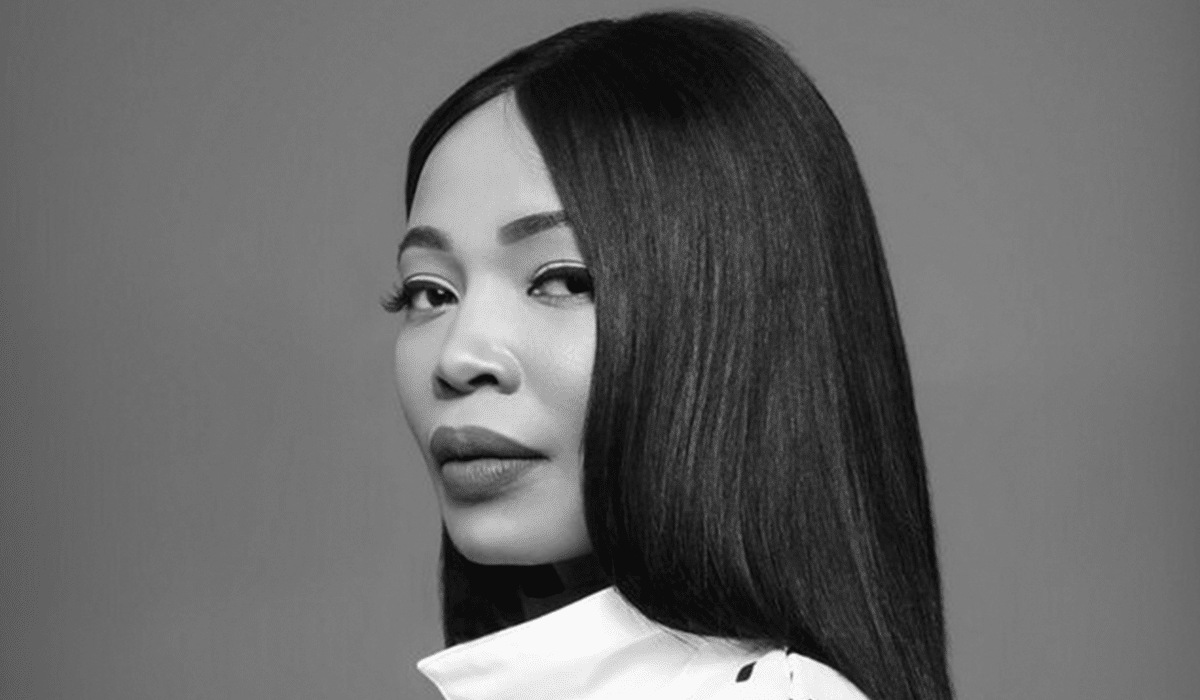Creative consultant and former magazine editor Asanda Sizani takes Africa to the world by championing women’s stories and creating legacies for those who were once forgotten.
She exudes elegance as we walk into our studios. Dressed in pants branded with the Snowflake cake flour logo (which we all swooned over, of course), hair slicked back in a ponytail and chic stilettos, Asanda Sizani greets the team. “I’m so used to being on the other side of the camera, so this is very new for me,” she says.
A renowned fashion editor, creative consultant and co-founder of Legacy Creates, she’s a force to be reckoned with in the world of content creation. Born in the historic town of Alice, also known as Dikeni, in the Eastern Cape, her upbringing in a household that valued writing and celebrated the arts laid the foundation for her career. Today, she stands as a global African committed to empowering and uplifting women through her work.
“My mother worked at Fort Hare University and Lovedale Press, where classic literature and the isiXhosa Bible were published, and this instilled in me a deep appreciation for the written word,” she remembers. “The arts, especially literature and music, were celebrated in my household and community.”

This exposure to a rich cultural heritage shaped Asanda’s perspective and fuelled her passion. As a young girl, she engaged in early forms of content creation without even realising it. She was a curious child, observing everything and documenting daily life through scrapbooks, journals and paintings.
Her innate ability to people-watch and capture the essence of conversations and moments in vivid detail set the stage for her future as a content creator. “I enjoyed listening to the chatter of those who visited our home. When guests left, I could detail the conversations, gestures and outfits frame by frame, like a storyboard,” she says.
“I wanted to leave the door open for others to confidently walk through and create their legacies”
Her keen eye for detail and her love for storytelling would become the driving forces behind her remarkable career. Throughout her journey, Asanda found guidance and inspiration from strong women in her life. Her mother, a single parent who raised four children while working tirelessly, instilled in her the values of diligence, hard work and uplifting others.
“She taught me invaluable life lessons and practical skills, such as reading music, which would later prove invaluable in my research projects involving music from the 19th-century South African archive.” Another influential figure in Asanda’s life was her grandmother, who passed on the tradition of iintsomi, or folklore.
“Through my grandmother’s stories, my imagination was ignited and I developed a deep appreciation for African stories and storytellers,” she says. This would become a cornerstone of her work, as she sought to reclaim forgotten histories and amplify the voices of African women through her documentaries, books and art exhibitions.
Asanda’s entry into the fashion and media industry was no stroke of luck or coincidence. From a young age, she had a clear vision of the space she wanted to occupy and was intentional in pursuing design, fashion media and creative storytelling. “Even as a university student, I immersed myself in various creative endeavours, from submitting scripts to TV production companies to styling campaigns for musicians and designer friends,” she explains.
Her relentless pursuit of knowledge and experience in the industry eventually led to her becoming the youngest fashion editor at Drum magazine (at age 23), then the first black fashion director at Elle South Africa and eventually the first black editor-in-chief at Glamour magazine, worldwide.

While Asanda’s accomplishments as a trailblazer in the fashion magazine industry were significant, they also highlighted the slow pace of transformation within the field. When she attended international editors’ conferences, she often found she was the only person in the room who looked like her.
“This realisation fuelled my determination to make a meaningful contribution to diversity and inclusion as an editorial head and brand custodian. I made intentional choices in stories and event showcases, and who was on the cover of the magazine, ensuring that under-represented voices were celebrated and amplified,” she says.
“I wanted to leave the door open for others to confidently walk through and create their legacies.” Today, Asanda co-owns Legacy Creates, a 100% black-women-owned media and creative consultancy. The company is dedicated to reclaiming forgotten African women’s stories and ensuring that their legacies are recognised. Asanda is especially passionate about ground-breaking studies that recognise historical women’s important role in society, knowing that her own existence is intertwined with the women who came before her.
“By speaking their names and uncovering their stories, we are engaged in the important work of remembering and undoing the erasure of women’s contributions.” Through Legacy Creates, she approaches storytelling with the intent of providing a sense of place and belonging.
Their projects pay homage to pioneering South African women – such as the book-journal about early 20th-century writer and pioneering journalist Nontando ‘Noni’ Jabavu, and the short film Amagama ka Nokutela, about Nokutela Mdima-Dube, who back in the 19th century was a co-founder of a newspaper and school, an educator and political activist, musician and essayist.
“When it comes to uplifting other women across South Africa through my work, the end goal is clear: I want to gather the fragments that affirm their contributions to society, write forgotten African women back into history, and make sure their stories are studied and included in educational curricula.”
“The collaborative process at Legacy Creates is driven by a collective vision of resisting the silencing of marginalised voices. My team and I identify individuals who offer diverse skill sets and share the same commitment to amplifying under-represented voices,” she says. “With a focus on women telling women’s stories, we strive to bring reverence, accuracy and nuanced sensitivity to their work.”
While Asanda’s professional journey has been filled with notable accomplishments, she has faced challenges along the way. “One of the biggest in the arts, including content creation, is funding. We initially self-funded projects like the Nokutela and Noni initiatives. However, resources are crucial for sustaining and expanding our work, contributing to the country’s economy and creating opportunities for others,” she explains.

Despite these challenges, she advises fellow creatives to work with what they have, harnessing their resourcefulness and innate ability to create magic from very little.
Handling criticism and feedback is an integral part of Asanda’s growth as a content creator. While she differentiates between criticism and feedback, perceiving the former as negative and judgemental, she welcomes and solicits feedback as a gift. “Feedback, whether corrective or positive, helps me become better and more effective in my work. I appreciate feedback that is fact-based and addresses specific behaviour or actions,” she says.
“I remain focused on the value of my work, the guiding principles that inform it and the overall outcome of creating change.”
“As my work is highly sensitive and emotional, I recognise that everyone will have opinions and viewpoints about how it should be done, but I try to remain focused on the value of my work, the guiding principles that inform it and the overall outcome of creating change.”
For Asanda, defining success as a content creator is about being a conduit and serving the art. Success lies in ensuring that the art lives and that she has done her best in being of service to it. “It’s not about personal accolades or individual achievements but about the impact my work has on others and the legacy it creates.”
To aspiring content creators wishing to make a meaningful impact, she offers this valuable advice. “Staying abreast of industry news, trends and innovation is crucial for growth and relevance. Then look inward and draw inspiration from your own journey, family, community and country. No one can tell your story as well as you can – showcase the unique perspective and voice that’s essential to creating impactful content,” she says.
Asanda lives by the idiom: Inyathi ibuzwa kwabaphambili, which means ‘Seek wisdom from those who came before us’. As she follows her journey, Asanda’s impact will undoubtedly shape the landscape of content creation and serve as an inspiration for aspiring creators who follow in her footsteps.
Keep up with Asanda:
Words By: Melissa Ndlovu
Photography: Zhann Solomons







